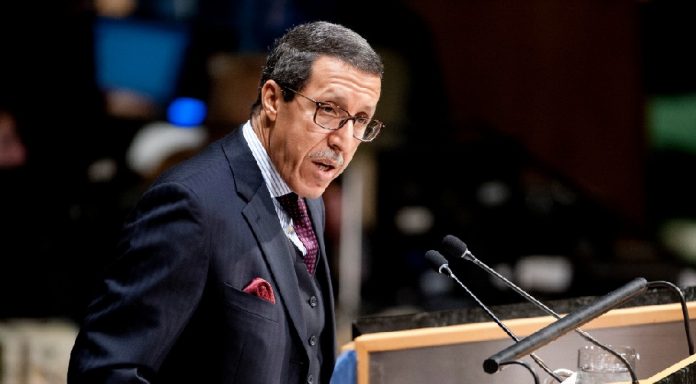On Friday, Morocco’s Permanent Representative to the United Nations, Ambassador Omar Hilale, addressed a letter to the President and members of the UN Security Council. In this letter, he condemned Algeria’s exploitation of its Security Council mandate to further its biased stance on the Moroccan Sahara issue.
“The Kingdom of Morocco regrets that the briefing organized by the Security Council on May 30, 2024, on the situation of refugees and displaced persons in the world, was exploited by the ambassador, permanent representative of Algeria, Amar Bendjama, in his capacity as a non-permanent member of the Council, to advance the biased position of his country on the question of the Moroccan Sahara, as well as on the disastrous situation, which unfortunately characterizes the daily life of the populations sequestered in the Tindouf camps, in Algeria,” Hilale stated in his letter.
Hilale noted that instead of addressing the eight humanitarian situations highlighted by the United Nations High Commissioner for Refugees, Filippo Grandi, during his briefing, the Algerian ambassador focused solely on the Moroccan Sahara, despite it not being mentioned by Grandi. He added that Algeria’s actions clearly demonstrate it as the main party to the regional dispute it has created and maintained, violating the principles of good neighborliness and the legal, historical, and political foundations of Morocco’s sovereignty over the Sahara.
Addressing the falsehoods propagated by the Algerian ambassador, Hilale asserted that “Algeria does not in any way welcome the populations of the Tindouf camps. On the contrary, it has sequestered them against their will for more than five decades. It has used them in its policy of constant hostility against the territorial integrity of the Kingdom of Morocco.”
Hilale further highlighted the reality contrary to the Algerian ambassador’s claims that these populations are awaiting international community action to return voluntarily to their land. “In fact, Algeria refuses them this right of return to their motherland, Morocco, although guaranteed by international humanitarian law, in particular, the 1951 Convention relating to the status of refugees,” he explained. Algeria’s categorical refusal to register these populations violates its obligations under the 1951 Convention and all Security Council resolutions since 2011.
For half a century, Hilale noted, Algeria has violated the statutory mandate of the UN High Commissioner for Refugees (UNHCR) by prohibiting the registration of these populations, which is standard practice in all refugee situations worldwide. Algeria also denies the populations in the Tindouf camps the right to choose between three durable solutions offered by international humanitarian law: voluntary return, local integration, or resettlement in a third country. The populations are confined to the camps, surrounded by security cordons of the Algerian army, services, and armed “polisario” militias.
Hilale criticized Algeria for politicizing international humanitarian law by conditioning the return of Tindouf camp populations to the Moroccan Sahara on a so-called referendum. He emphasized that the only viable solution to this regional dispute is the Moroccan Autonomy Initiative within the framework of Morocco’s sovereignty and territorial integrity. This initiative has been deemed serious and credible in all Security Council resolutions since 2007.
The Security Council, in its latest resolution 2703 of October 30, 2023, calls for a political, realistic, pragmatic, sustainable, and compromise solution, urging Algeria to participate in the third round table within the exclusive UN political process.
Hilale highlighted Algeria’s violations of the basic rights of these populations, depriving them of international humanitarian aid, which is systematically looted by the leaders of the “polisario” armed group and the Algerian Red Crescent. These misappropriations have been confirmed by the European Anti-Fraud Office (OLAF) and the United Nations World Food Program in its January 2023 report titled “Evaluation of Algeria WFP Interim Country Strategic Plan 2019-2022.”
Hilale further stated that the Tindouf camps are militarized, violating international humanitarian law, which mandates the civilian nature of refugee camps. Algeria, while claiming to respect its sovereignty, has delegated its sovereign prerogatives to an armed group linked to terrorism, the “polisario,” by ceding part of its territory, the Tindouf camps, a move condemned by the UN Human Rights Committee and other international bodies as contrary to international law.
Ambassador Hilale concluded by expressing Morocco’s hope that the Algerian ambassador would focus more on urgent global peace and security crises rather than promoting Algeria’s political agenda against Morocco.
The letter from Ambassador Hilale to the President and members of the UN Security Council will be published as an official document of the UN body.





